South Korea’s new President Lee vows to revive democracy from ‘near demise’

South Korea has entered a new political chapter as Lee Jae-myung takes office as president. His inauguration follows months of political turmoil, ending with the dramatic impeachment of former President Yoon Suk Yeol. Lee promises to restore democracy and guide the country toward stability.
A Nation in Political Upheaval
South Korea faced intense political instability over the past year. In December 2024, former President Yoon attempted to impose martial law, sparking outrage. The Constitutional Court removed him from office in April 2025. This decision reassured many citizens about the resilience of democratic institutions.
However, the crisis revealed deep national divisions. It also raised serious concerns about the concentration of power within the executive branch. Voter turnout reached a record high in the snap presidential election. Lee Jae-myung, representing the liberal Democratic Party, narrowly defeated conservative Kim Moon-soo.
Lee Jae-myung’s Rise
Lee’s life story strikes a chord with many South Koreans. Born into poverty, he worked in factories during his youth and later became a human rights lawyer. He previously served as governor of Gyeonggi Province and ran for president in 2022, losing to Yoon.
His blunt style and working-class background helped him connect with voters. Supporters see him as a fighter who challenges corruption and bureaucracy. Although he remains popular, Lee also faces legal scrutiny for allegedly making false campaign statements. Courts have delayed proceedings, but the issue may resurface.
A Clear Democratic Vision
In his first speech as president, Lee declared his mission to revive South Korea’s democracy. He described the recent political crisis as a “near collapse” of democratic norms. He pledged to protect civil liberties and rebuild public trust in government.
“The voice of the people must never be silenced again,” he said. “I will lead with transparency and integrity.”
Lee plans to introduce laws that limit presidential powers. His administration will also focus on increasing judicial independence and strengthening checks and balances. These changes aim to prevent future abuses of authority.
Tackling Economic Struggles
The president also faces pressing economic challenges. South Korea has seen slow growth, rising youth unemployment, and high housing prices. Lee’s policies will focus on boosting job creation, investing in technology, and expanding welfare programs.
He introduced a “Digital Korea” plan that promotes innovation in AI, renewable energy, and smart infrastructure. Lee believes economic strength should benefit everyone—not just the wealthy.
“We must share prosperity fairly,” he said. “Growth without inclusion only deepens division.”
He also promised to remove unnecessary regulations and support startups to encourage entrepreneurship.
A New Diplomatic Approach
On foreign policy, Lee struck a balanced tone. He pledged to maintain strong ties with the United States and Japan. At the same time, he expressed interest in restarting dialogue with North Korea.
“Peace requires communication, not provocation,” he stated. “We must engage with North Korea through clear principles and a strong foundation.”
This approach aims to ensure national security while avoiding escalation. Analysts say Lee’s diplomatic strategy will test his leadership on the international stage.
Public Reaction and Next Steps
Public response to Lee’s inauguration has been mostly positive. Many see his election as a chance to fix what they view as democratic backsliding. However, some remain cautious, especially conservatives who question his ability to unite the nation.
Lee will face resistance in the National Assembly, where conservatives hold significant influence. Passing reforms will require careful negotiation and broad public support. He must also prove that his administration can deliver on economic and political promises.
A Critical Turning Point
South Korea stands at a turning point. The nation must heal from a severe political crisis and move toward democratic renewal. President Lee begins his term with strong public expectations and a mandate for change.
His success will depend on action, not just words. Restoring democracy, growing the economy, and leading responsibly will shape the country’s future. The world now watches as South Korea begins this new journey.






